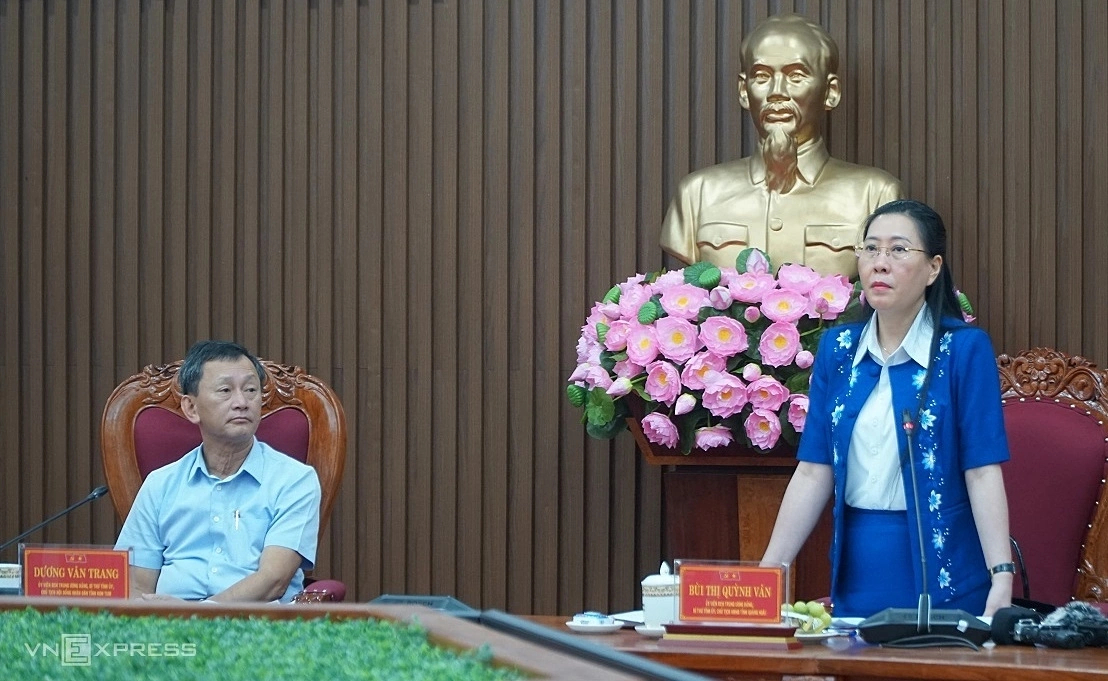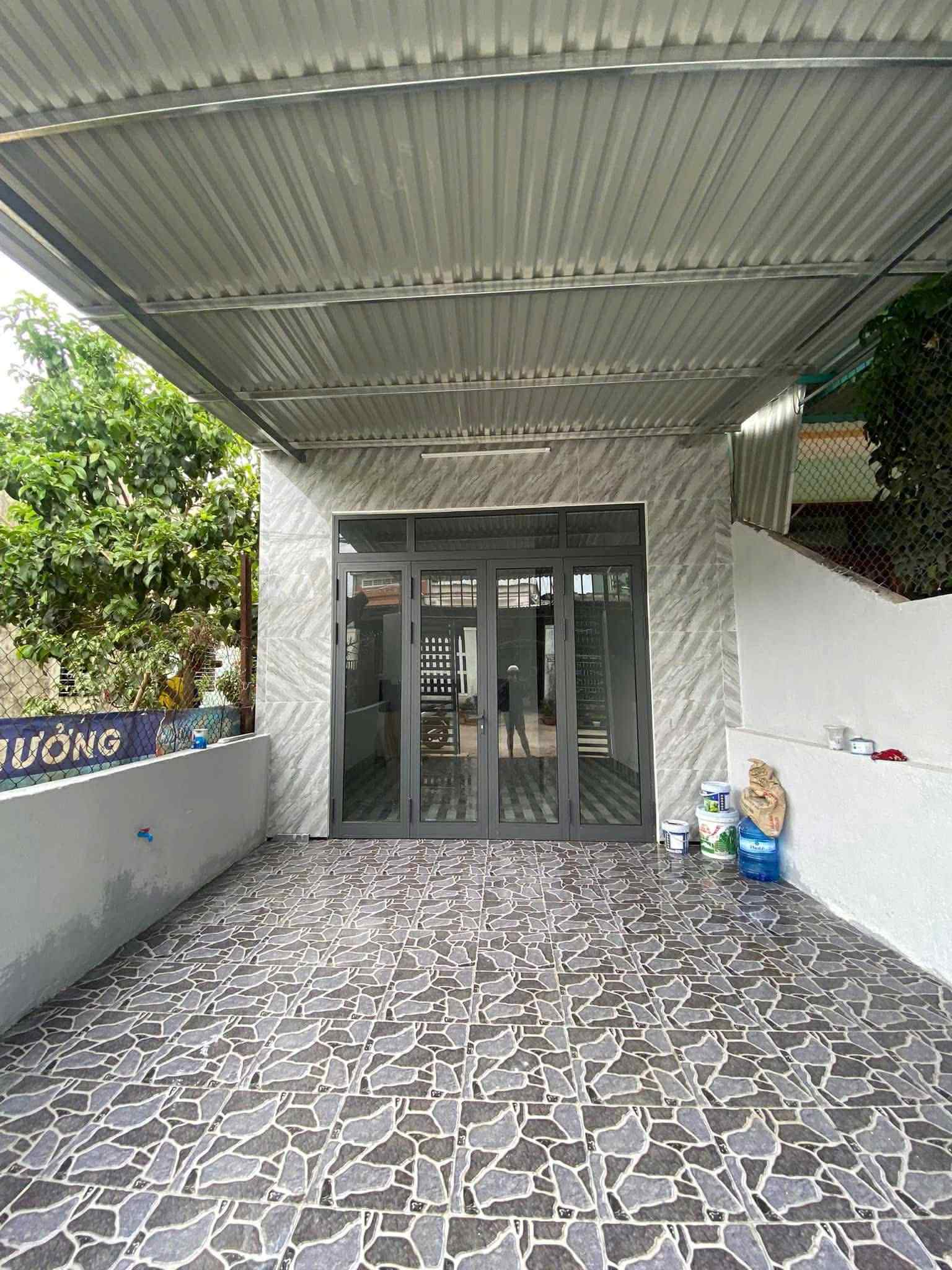Following the provincial merger plan finalized on 11/5, civil servants at the deputy director level and above were allocated public housing. The majority of the remaining 1,100 employees had to find their own accommodation with a monthly support of 2 million VND for the first two years.
With over a thousand individuals and families simultaneously seeking housing, real estate in Quang Ngai city center suddenly became scarce and prices surged. Bao and his wife spent two days, 21-22/6, searching for a rental, viewing six properties but unable to settle on one.
"Firstly, the prices were too high, and secondly, the houses were too old," said Bich Ngan, 33, Bao's wife. "The relatively decent places were nearly 10 kilometers from the office, and even those were no less than 3.5 million VND."
On their way back to Kon Tum, they received a call from a real estate agent with photos of a house for rent at 4.5 million VND. Seeing that it was new and not too far from work, the couple immediately agreed, "We'll rent it. There's no time to be picky now."
Ngan transferred the deposit, but just a minute later, the agent called back to apologize as the landlord had already accepted a deposit from someone else. Five minutes after that, the agent called again, saying they had negotiated with the landlord. "Just renting a house, but our emotions were on a rollercoaster," she said.
The couple's sighs revealed the weight of their unspoken concerns.
 |
Quang Ngai Provincial Party Committee Secretary Bui Thi Quynh Van (right) and Kon Tum Provincial Party Committee Secretary Duong Van Trang at the provincial merger conference on 11/5. Photo: Pham Linh |
Quang Ngai Provincial Party Committee Secretary Bui Thi Quynh Van (right) and Kon Tum Provincial Party Committee Secretary Duong Van Trang at the provincial merger conference on 11/5. Photo: Pham Linh
From the beginning of July, Bao will transfer to work in Quang Ngai, nearly 200 km from his home. The new Quang Ngai province is the fifth largest in the country, with 95 commune-level administrative units and one special zone. The population is over 2.1 million. The administrative center is located in Quang Ngai city.
Among the 28 merged provinces and cities, Kon Tum and Quang Ngai are the furthest apart geographically. The terrain and travel between the two locations are more complex than just the kilometers suggest. The road from Kon Tum city to Quang Ngai city mainly follows National Highway 24. This route has two challenging sections: Kon Plong - Mang Den with continuous, winding slopes and frequent fog in the early morning or late afternoon; and Ba To - Son Ha with narrow roads, many bends, long downhill stretches, and heavy truck traffic.
There are few buses on this route. Many people book tickets in advance but still have to stand for hundreds of kilometers. For civil servants without personal vehicles, the 5-hour journey through the difficult terrain, crossing the two passes of Vi O Lac and Mang Den, will be even more arduous.
Bao and Ngan were entering a stable phase of their lives. Two years ago, they took out a bank loan to buy a small plot of land and renovate a level-4 house in Kon Tum city. At the end of last year, they bought a car for the convenience of taking their children to visit their elderly grandparents. Every month, they paid 10 million VND in bank interest alone. "We invested based on the belief that 'a civil servant's salary may not be high, but it's stable.' But now, that stability is gone," Ngan said.
At his new job, Bao's salary will decrease by about 1.6 million VND due to the loss of regional allowances. From one cozy home, they are now about to split into two rented houses, two kitchens, and two sets of living expenses. The cost of renting a house in his new workplace alone consumes nearly half of his income.
Facing the prospect of being unable to afford the bank loan repayments, they decided to put their house up for sale. However, amidst the wave of civil servants leaving Kon Tum, real estate transactions have slowed down. Their house has not yet attracted any buyers.
The most difficult issue is their two daughters, who are about to enter 2nd and 4th grade. The couple has spent many nights weighing two options. Either Bao goes alone, and Ngan stays behind to continue working and caring for their children, maintaining stability in their education and minimizing disruption, but facing significant hardship. Or each parent takes one child, sharing the burden but separating the children, one missing their father and the other longing for their mother.
"Thinking about the debt is exhausting, but thinking about the children is heartbreaking," Ngan said.
They haven't shared their worries with their families for fear of causing them anxiety, nor have they spoken to colleagues because "everyone is struggling at this time." But they know they are not alone.
"My wife and I always keep in mind and encourage each other to contribute our best to the country's development," Bao said, "But our children and finances are two things that are undeniably weighing on our minds."
Bao hopes to bring his entire family to Quang Ngai if his wife, a teacher, can find a suitable job. "The family is the basic unit of society. If families are happy, society can develop sustainably," he said.
 |
The apartment Ngan and her husband rented in Quang Ngai city for 4.5 million VND, about 4 km from his workplace. Photo: Provided by the interviewee |
The apartment Ngan and her husband rented in Quang Ngai city for 4.5 million VND, about 4 km from his workplace. Photo: Provided by the interviewee
Their situation is not unique. VnExpress reporters' investigations into civil servant families in Ha Giang and Quang Tri provinces revealed that many families have suddenly found themselves living in two different places. They have temporarily left behind spouses, young children, elderly parents, and familiar homes to start anew in unfamiliar territory. Many families have split their children, as a way to share both love and burdens.
"Merging administrative systems is a major undertaking, and we understand that it requires sacrifices from each individual. As those involved, we are starting over with the most basic things: finding a house, buying a stove, setting up beds, and choosing schools for our children," shared Tinh, a civil servant in Ha Giang who will be transferring to Tuyen Quang.
This weekend, Bao and his wife will return to Quang Ngai to finalize the house rental agreement. The new apartment is about 4 km from his workplace. They will visit the nearby elementary school, which might be their eldest daughter's new school, and then explore some local markets. On the nearly 5-hour drive back through the mountains, they will continue to plan what belongings to bring and what they need to purchase.
As their car passed the foggy peak of Vi O Lac pass, they fell silent. At an altitude of 1,300 meters, what was once the boundary dividing the East and West Truong Son mountain ranges now also serves as an invisible line between their old life and their new journey.
"From this cloud-covered mountaintop, our family's journey, like that of thousands of other civil servants, is entering a new chapter, more challenging but also full of hope," Bao said.
They hope to be welcomed in the new land, free from discrimination and prejudice. "At least that would be some comfort as we embark on this journey with so many unknowns ahead," Ngan shared.
*Names in this article have been changed.
Phan Duong












